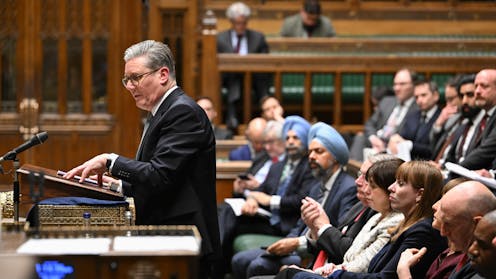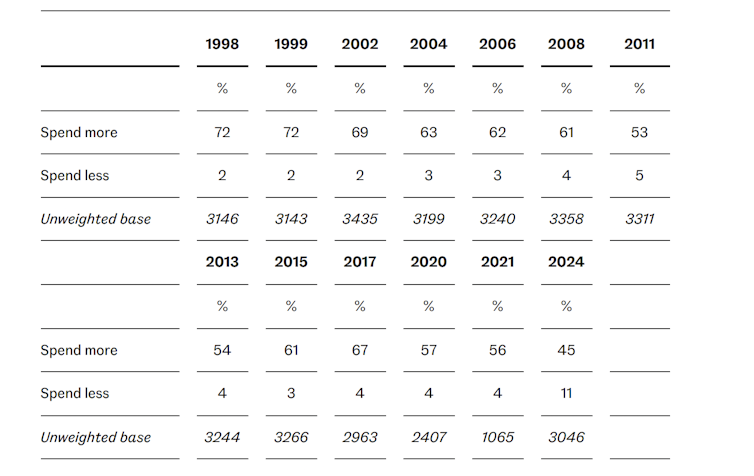
Keir Starmer has been dealing with his most serious parliamentary challenge since he became prime minister. More than a hundred Labour MPs backed a motion to stop in its tracks the government’s attempt to reduce the welfare bill, including by raising the threshold at which someone can claim disability benefit.
This issue has divided the parliamentary Labour party. But what does the public think?
Although there are signs people recognise that spending on disability benefits is now relatively high, the latest annual British Social Attitudes (BSA) report reveals that it is far from clear that they are supportive of cutbacks. And, unfortunately for the government this is especially true of those who voted Labour last year.
Ever since the late 1990s, BSA has regularly asked its respondents whether they would like “to see more or less government spending than now on benefits for disabled people who cannot work”. In 1998, 78% indicated they would like to see more spending. By 2011, that figure had fallen to 53%, and it was still no more than 56% in 2021.

Now, though, only 45% would like to see more money spent on disability benefits. For the first time, less than half the country backs giving those with a disability more help.
However, that does not mean most voters would like to see actual cutbacks. Only 11% say the government should spend less on disability benefits. The rest are content with the status quo.
Meanwhile, just 5% of those who voted Labour last year back less spending. Over half (53%) are in favour of an increase.
The government’s central argument is that it has become too easy to claim disability benefits and that this is discouraging people from getting back into employment.

There is some support for this view. Among the public in general, 29% say it is “too easy” to claim disability benefit. The trouble is, just as many, 29%, take the opposite view and say it is “too difficult”. The most popular response, given by 35%, is that it is “neither too easy nor too difficult”.
Meanwhile, among Labour voters, the balance of opinion is clearly tilted towards the view that claiming disability benefit is “too difficult”. As many as 39% say so, while only 20% feel it is “too easy”.
Similarly, most voters (62%) feel the requirement for people on disability benefits to take “active measures to find appropriate work” is “about right”. Just 11% feel it is “too weak”, while more than twice as many (23%) believe it is “too tough”. Only 6% of Labour voters believe it is “too weak”.
Want more politics coverage from academic experts? Every week, we bring you informed analysis of developments in government and fact check the claims being made.
Sign up for our weekly politics newsletter, delivered every Friday.
These figures help explain why the government has seemingly been struggling to head off the rebellion. Already burned by voters’ reaction to last year’s cutback to the winter fuel allowance, and with their party trailing Reform in the polls, Labour MPs now find themselves presented with another cut that threatens to be unpopular with many of those who put them into Westminster. Little wonder there are now signs the government is having to bend to their view.
.
John Curtice is currently in receipt of funding from the Economic and Social Research Council.
This article was originally published on The Conversation. Read the original article.


.png?w=600)




